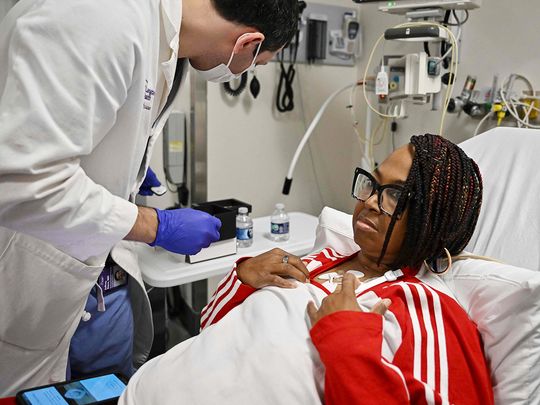
WASHINGTON: Towana Looney donated a kidney to her mother in 1999 only for the remaining one to fail several years later due to pregnancy complications.
Now, the 53-year-old from Alabama has become the latest recipient of a gene-edited pig kidney - and is currently the only living person in the world with an animal organ transplant, New York's NYU Langone hospital announced Tuesday.
"I'm overjoyed, I'm blessed to have received this gift, this second chance at life," Looney said during a press conference, held three weeks after the procedure.
Xenotransplantation, the process of transplanting organs from one species to another, has long been a tantalizing yet elusive scientific goal. Early experiments on primates faltered. But recent advances in gene editing and immune system management have brought the dream closer to reality.
Pigs have emerged as the ideal donors: they grow quickly, produce large litters and are already part of the human food supply.
Advocates hope this approach can help address the severe organ shortage in the United States, where more than 100,000 people are waiting for transplants, including over 90,000 in need of kidneys.
A last chance
Looney had been living with dialysis since December 2016 - eight grueling years. High blood pressure caused by preeclampsia had taken its toll, leaving her with chronic kidney disease.
Despite receiving priority on transplant waiting lists as a living donor, her search for a compatible kidney was a frustrating dead end. Her unusually high levels of harmful antibodies made rejection almost inevitable, and as her body lost viable blood vessels to support dialysis, her health declined.
Out of options, Looney applied to join a clinical trial for pig kidney transplants, and finally underwent the seven-hour surgery on November 25.
Asked how she felt afterward, Looney's joy was infectious. "I'm full of energy, I've got an appetite... and of course, I can go to the bathroom. I haven't been going in eight years!" she laughed, adding that she was looking forward to celebrating at Disney World.
Jayme Locke, a surgeon on the transplant team, described the results with awe. "The kidney functioned essentially exactly like a kidney from a living donor," she said, adding that Looney's husband saw a rosiness in her cheeks for the first time in years.
"That is the miracle of transplantation."
Cautious optimism
Looney's surgery is the third time a gene-edited pig kidney has been transplanted into a human who is not brain dead.
Rick Slayman, the first recipient, died in May, two months after his procedure at Massachusetts General Hospital. The second, Lisa Pisano, initially showed signs of recovery following her surgery at NYU Langone, but the organ had to be removed after 47 days, and she passed away in July.
Looney, however, was not terminally ill before the transplant, noted Robert Montgomery, who led the surgery. He said each case offers valuable lessons, helping teams refine their techniques.
The kidney was provided by biotech company Revivicor, which breeds pigs with genetically modified kidneys less likely to be rejected by patients' immune systems.
It features 10 genetic edits to enhance compatibility with the human body - an advance over earlier efforts that used kidneys with a single gene edit and included the pig's thymus gland to help train the host's immune system and prevent rejection.
Both methods are expected to undergo clinical trials "probably by this time next year, or even sooner," Montgomery added.
A pioneer in the field, Montgomery performed the first gene-edited pig organ transplant into a neurologically deceased patient in 2021. Looney's surgery marks his seventh human xenotransplantation.
Looney was discharged December 6 to a nearby New York City apartment. Though her high antibody levels remain a concern, doctors are monitoring her closely using wearable technology and are trying a novel drug regimen to prevent rejection.
Periodic hospital visits may still be required, but the team remains optimistic she can return home in three months.
These procedures show that genetically modified pig organs could one day serve as viable replacements for human organs in patients. Here's a timeline of the key milestones in these preclinical trials.
September 2021: First pig kidney transplant
After years of research in primates, NYU Langone Hospital in New York performed the first transplantation of a genetically modified pig kidney into a human.
The kidney wasn't fully transplanted but was instead connected to the blood vessels of a brain-dead patient.
January 2022: First heart xenotransplant
On January 7, 2022, David Bennett became the first human to receive a genetically modified pig heart, transplanted by surgeons at the University of Maryland.
The pig's genome, developed by the company Revivicor, included ten modifications to improve compatibility and prevent rejection by the human body. The heart "performed very well for several weeks without any signs of rejection."
Bennett died two months later. The pig heart was later revealed to be carrying a porcine virus, which some researchers say may have contributed to the experiment failing, the MIT Technology Review reported.
Ahead of the transplantation, Bennett, who had been bed-ridden and on an emergency life support machine, was deemed ineligible for a human transplant - a decision that is often taken when the recipient has very poor underlying health.
March 2024: First kidney transplant in a living patient
For the first time, a genetically modified pig kidney - developed by the company eGenesis - was transplanted into a living patient at a Boston hospital.
The patient, Richard Slayman, was suffering from end-stage kidney disease and had already received a human kidney transplant in 2018.
He died two months after the pig kidney procedure, but Massachusetts General Hospital stated it "had no indication that it was the result of his recent transplant."
April and November 2024: Kidney transplants
In April 2024, NYU Langone Hospital successfully completed its second pig kidney transplant in a critically ill patient, Lisa Pisano.
"The organ functioned well for the first month," but repeated drops in blood pressure forced the surgeons "to remove it after 47 days," the hospital reported. Pisano died six weeks later.
On November 25, 2024, a third living patient, Towana Looney, received a pig kidney. In better health than previous recipients, Looney is expected to return to her native Alabama in three months.












